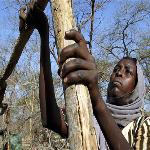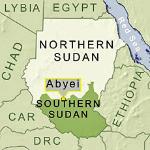17 December 2009

Photo: AP
A woman from Misseriya tribe is building a thatched shelter in Goli, Sudan, during the annual migration to the Abyei area, 19 Jan 2009
In early December, crowds gathered outside the police station in Khartoum to protest the detention of senior Southern party officials. The South's ruling party, the Sudan People's Liberation Movement, had organized a political rally with Northern opposition groups. Khartoum authorities beat the demonstrators back, declaring the protest "illegal".
Offices of the North's ruling National Congress Party were attacked across parts of the South. Southern civil society and religious groups soon issued statements expressing concern that the peace was beginning to crumble. Observers feared the incident was a turning point in the deterioration of relations between the peace partners.
One week later, the two parties announced what was arguably their most important breakthrough of the year - reaching a compromise on the details of the upcoming Southern independence referendum. The deadlocked talks about this prized self-determination right for the South had been at the heart of rising tensions between the two sides for months.
The week's events highlighted the innate fragility of the North-South peace, but the referendum deal also gave hope that the path to peaceful co-existence has yet to be fully abandoned by either side.
This past year has seen frequent heated exchanges between the two peace partners, with the NCP accusing the South of not being committed to giving national unity a chance and the SPLM alleging the NCP of acting in bad faith towards the agreement.
NCP official Rabi Abdulaati told VOA that any accusation that the NCP was seeking to undermine the peace deal was false.
"The National Congress Party is fully committed to implement the CP, and it is fully committed also to abide by the mechanisms for resolution of any conflict between the two parties regarding any pending points," he said.
However, in an interview in the Southern capital, Juba, the head of SPLM's Southern office, Anne Itto, said that the manner in which negotiations have been stalled and the timetable of the CPA pushed back shows that NCP is not acting as a committed peace partner.
"If you follow the Comprehensive Peace Agreement, this [referendum] law should have been out over a year ago. And, indeed we started negotiating, trying to get the bill ready for the parliament, before a year ago. It took us a very very long time," she said.
The delayed pace in implementing the peace deal was evidenced in early April, as elections originally slated for July 2009 were pushed back to February 2010. A little less than three months later, the elections were pushed back an additional two months, to April of this coming year.

But the year did see one critical flashpoint roll by peacefully. In late July, the Permanent Court of Arbitration at The Hague issued a compromise ruling about the disputed oil-rich border region, Abyei. Although the tension in Abyei continues to simmer, feared clashes about a final ruling did not materialize, as both sides voiced acceptance for the verdict.
Looking back, Sudanese analyst John Ashworth says that, taken altogether, the previous year's developments have done little to bolster the peace.
"I wouldn't like to say there is no reason for hope - I think there is always reason for hope - but I would say there has not been much progress," he said.
The year ahead is fraught with challenges. The April elections are causing increased friction, as the SPLM publicly mulls an alliance with northern opposition groups against the NCP. And, the Khartoum government appears to be digging in its heels against calls to reform security laws to allow a free and fair vote.
But analysts say the elections, volatile as they may be, are only a sideshow to the main act. The Southern independence referendum is the key cornerstone of the CPA and the North is unlikely to let the oil-ladened South go without some intense negotiations. These, too, are behind schedule.
Ashworth says that, at this point, any positive outcome in the next year will require the two parties to re-focus their energies on only the most crucial points of remaining contention.
"We're in the end game of the CPA now, which is why we are getting this increased tension, because we have very little time left to implement it - when you look at the legislation that has to be passed, but also when you look at the simple logistics. In fact it's impossible to implement the entire CPA in the time given, so much is behind schedule," he added.
With the alternative of renewed war looming, most Sudanese hope that 2010 will prove the CPA has greater resilience than many expect.